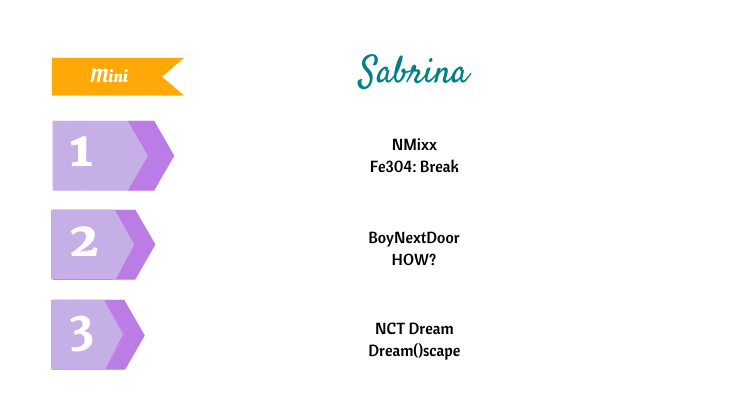Albums have been something of a neglected art form in K-pop over the past few years, as there has been a greater emphasis on singles. In my mind, a great album is not just defined as a “no skip” collection of songs, but are musically or thematically cohesive, or have engaging progression from beginning to end. The K-pop albums that have distinguished themselves from the rest also made a strong statement of the artists’ sound and identity.
SM has issued some notable offerings so far this year, with Taeyong’s Tap and Suho’s 1 to 3 as honorable mentions for their clear visions as soloists. NCT Dream’s latest EP Dream()scape, however, ultimately made my list because of the intriguing evolution of the group’s sound. Dream()scape signals a more mature and vulnerable direction, exploring the anxieties of twenty-something musicians. Conceptually, the album makes an overall progression from darkness to light, numbness to emotion. The dreamy, 808-filled “icantfeelanything” and sincere ballad “Breathing” make fitting beginning and ending markers on this trajectory.
That’s not to say that there is a linear narrative. With its braggadocio and even innuendo, title track “Smoothie” particularly seems out of place immediately following the uneasiness of “icantfeelanything.” It could be said that the album focuses on both the benefits and trappings of success. For example, “Carat Cake” depicts the allure of material things. With one or two more tracks, though, the album could have explored the multiple facets of stardom more fully.
While Dream()scape may have its flaws, it is still a compelling, sonically cohesive album. The production choices are made thoughtfully, such as in the hip hop track “Box,” where panning and volume changes underscore the assertion, “Don’t put me in a box.” The album’s layered soundscapes made me want to return to it, which made it one of the year’s best for me.
While NCT Dream expands their sound, Boynextdoor’s How? solidifies their spunky coming-of-age concept and sound of upbeat pop rock with hip hop elements. How? cleverly completes the trilogy begun with previous releases Who! and Why.., filling in some of the narrative between the meet-cute depicted in the former and post-break-up heartbreak in the latter. The album portrays various stages of first love, with the bouncy “Our” conveying the giddy nervousness of a first date. Title track “Earth, Wind & Fire,” with its high-pitched, sped-up chorus, illustrates the confusion about an unpredictable relationship.
“So let’s go see the stars,” which blends synth pop and rock elements, features the lyric “Right now, we’re like a scene from a youth movie.” The song, which peaks in a dramatic key change after the bridge, evokes nostalgia, as does rock ballad “Dear, My Darling.” Young love has certainly been a subject in many other albums, but Boynextdoor portrays the experience with great charm and confidence – and because of it, How? sold me on the group. With their trilogy presumably drawing to a close, I am intrigued about what might come next.
My number one pick is an album that has rarely left my playlist since I initially reviewed it in January. Sometimes one feels everything clicking about an artist when listening to an album, and in that respect, NMixx’s Fe304: Break represents an artistic breakthrough. It perfects the group’s ‘mixxpop’ sound, experimenting with switching genres and tempos without sacrificing coherence.
The first half of the album delves most into genre fusion. “Dash” sets the tone for the rest of the album, combining jazz-inflected vocals with a more hip hop-oriented chorus, then pop rock in the bridge. It also introduces the recurring theme of the album: passion for pursuing one’s own path. “Run for Roses,” one of the standouts on the album, is a unique Americana-inspired song that conveys this passion with fiddles and banjos in its instrumentals. The most surprising yet satisfying change-up might be the last 30 seconds of “Boom,” which enthralls with its accelerating club beats.
The second half of the album is decidedly less experimental, but provides a switch-up for the album at just the right time. “Passionfruit” and “XOXO” both feature pleasing harmonies as well as impeccable song production, while the pop rock “Break the Wall” maintains the determined intensity of the album’s first half. Fe304: Break showcases its versatility as an asset, proving that mixxpop is not a passing phrase, but at the core of NMixx’s artistic identity.
There were a number of full-length albums that similarly showcased the range of artists’ talents. Some such albums I considered for my list were P1Harmony’s Killin’ It and Moonbyul’s Starlit of Muse. When finalizing my picks for full albums, however, I heavily factored in the experience of listening to the album in one sitting. To me, the best albums take a listener on a journey from beginning to end, and should be experienced in its entirety.
Xdinary Heroes’ Troubleshooting ultimately made my list because it struck me as one with fantastic track arrangement. The first five songs are fast-paced, propulsive rock songs, from the punk of title track “Little Things” to the thumping percussion and crunchy guitar in “Undefined.” There is enough sonic diversity among the songs to keep things interesting, such as the rhythmic, sliding guitar in “Paint It” or the quickening tempo and key changes as “Money on My Mind” progresses.
After exploring various rock sub-genres while maintaining their explosive energy, Troubleshooting takes a more sentimental turn. Many albums tend to end with slow songs as an emotional flourish, but Troubleshooting features the comparatively mellow “Dreaming Girl” and lush ballad “Until the End of Time” halfway through. “Until the End of Time” in particular shows the vocalists’ impressive range and builds its emotion through its swelling strings and keyboard melodies.
The end of the album picks up energy again with the uplifting “Man on the Moon.” While “Moneyball” also incorporates frenetic hard rock guitar and synths in its chorus, there is a lightness compared to tracks in the beginning. “Night of Fireworks” meshes garage beats with guitar, and ends the album on a bright, celebratory note. Overall, Troubleshooting is a more mature and less playful album than their early works, but one that represents all their facets well.
ARTMS’ Dall stood out to me even more as an absorbing album on multiple levels. ARTMS is composed of five Loona members, and the pre-release singles “Flower Rhythm”, “Candy Crush” and “Air” interpolate Heejin and Haseul’s solo songs and Odd Eye Circle’s “Air Force One.”. The samples and lyrical references (such as the reference to “12 constellations” in “The Hitchhiker’s Guide to the Galaxy”) honor Loona as an indelible part of ARTMS’ identity. Their spacey, ethereal electro pop sound recalls early Loona, with creative director Jaden Jeong seeming to pick up where he left off with the group.
At the same time, most of Dall still has much to offer listeners without the context of Loona’s discography and lore. Dall features some of the strongest production of any K-pop album this year, creating gorgeous, atmospheric soundscapes. The title track “Virtual Angel,” for example, lures in listeners with its airy vocals and synth pop beats. “The Hitchhiker’s Guide to the Galaxy” experiments with space, tempo, and instrumentation, speeding up with drum n’ bass beats and, in the final act, slowing down to the rhythm of a ticking clock. It takes us on a journey like its title suggests.
With its ominous strings and an intense, industrial-influenced beat drop, the final track “Birth” causes some mood whiplash. The song, however, still fits thematically with its predecessors, “Distress” and “Butterfly Effect.” These three songs explore new beginnings after hardships, with the dreamy and melancholy “Butterfly Effect” drawing upon the theory of the ripple effects of seemingly small actions. It remains to be seen whether the darker horror concept of “Birth” foreshadows ARTMS’ next release, but as a whole, Dall dramatizes the process of resolving a past with both adversities and beautiful moments.
My top pick, RM’s Right Place, Wrong Person, also depicts personal adversities. To me, it exemplifies everything that makes a great album: tell a compelling story underscored by its musical choices and track arrangement. Displaying RM at his most raw and honest and musically experimental, the album vents about strained or inauthentic relationships (“Nuts,” “Domodachi”), unreasonable expectations others have of him as an idol (“Out of Love”, “Groin”), and loss of purpose (“Lost!”). The frequent switch-ups in the first few songs illustrate the feeling of dislocation RM experienced as he questioned his life as an idol during BTS’ hiatus. In particular, the sequencing of tracks aids storytelling, with the run from “Nuts” to “Out of Love” to “Domodachi” flowing together through distorted and dissonant instrumentation.
Another impressive trio of songs comes at the album’s end. “Around the World in a Day,” in which singer Moses Sumney’s falsetto repeats the mantra, “Only time will sort it out,” gives rise to a crescendo of clashing instruments and RM bursting forth in his verse. His last line, “I like my broken self bitch, that’s the shit” feels like a triumph. The album does not close with this anthemic R&B/rock song, however. “Credit Roll” poses the question, “When the credits roll, do you hang tight?”, leaving listeners to consider whether there is more to explore. Closing track “Come Back to Me” suggests that the struggle depicted throughout the album is coming to an end. Like “Around the World in a Day,” the song repeats a line as it melds together textures of instruments: “You are my pain, divine.” While RM could be addressing another person or himself, I think he is referring to his artistic inspiration.
The album feels like an outpouring of thoughts and emotions that RM has been holding onto, and through catharsis, he finds a sense of peace. More than any other album this year, Right Place, Wrong Person takes listeners on a personal journey – and makes composition and production choices that immerse us in his experience.
That is my take on mini-albums and full albums for the first half of 2024. There were a number of works to admire so far this year, and hopefully many more to come!
(Images via HYBE, SM Entertainment, JYP Entertainment, Modhaus).



